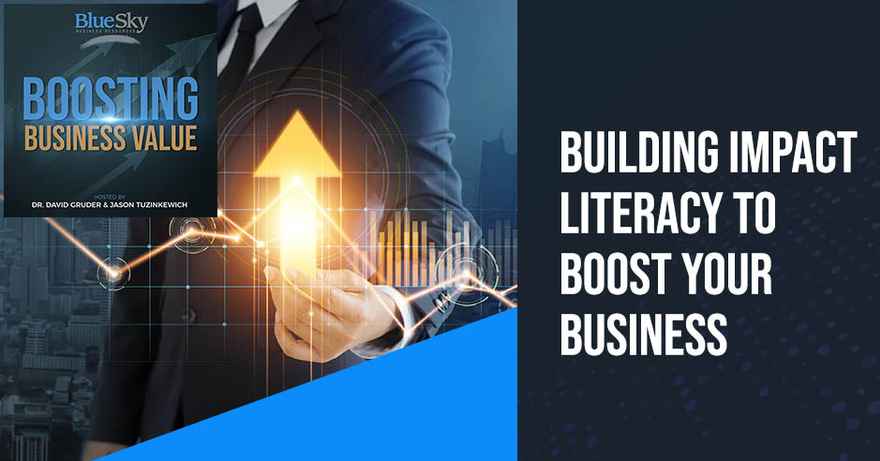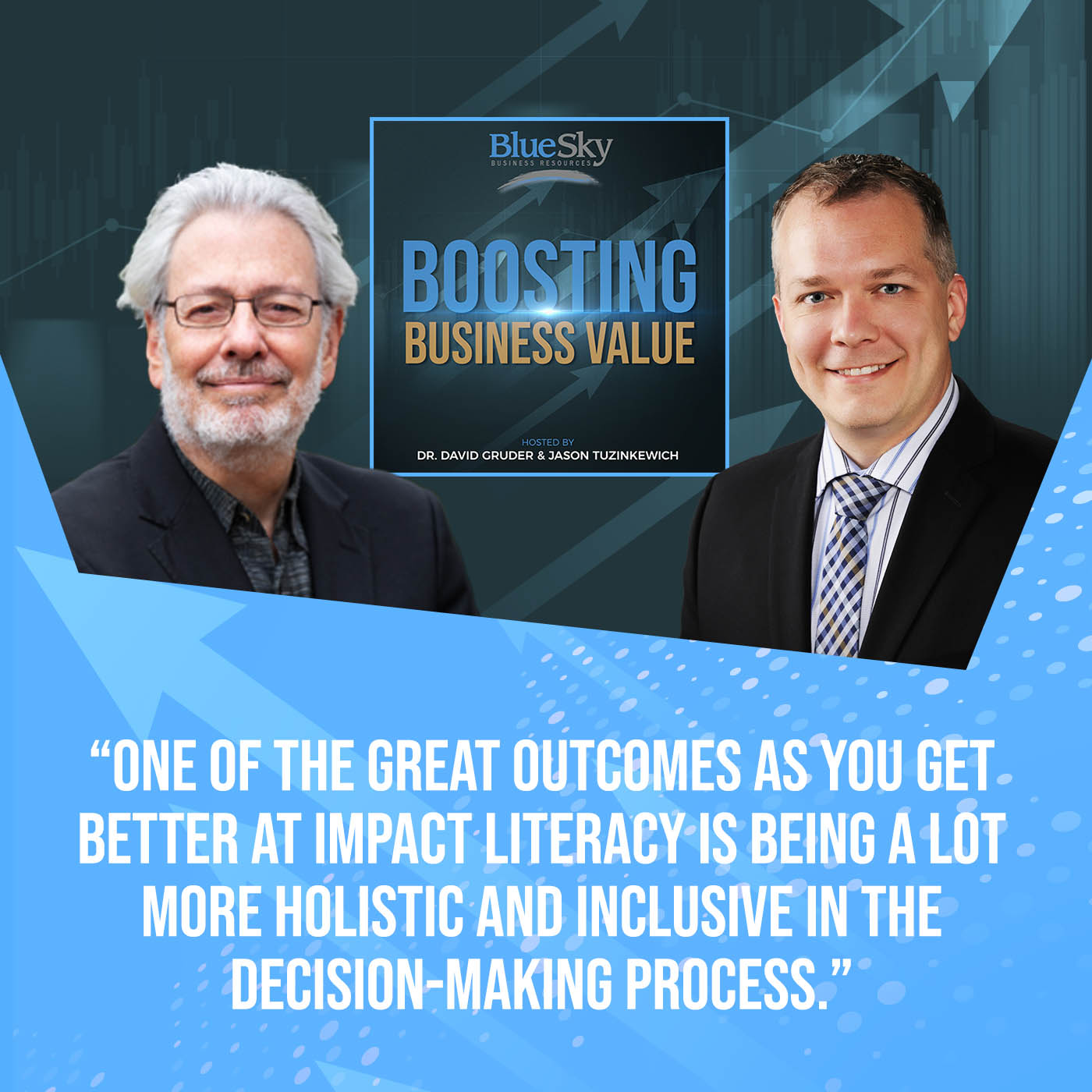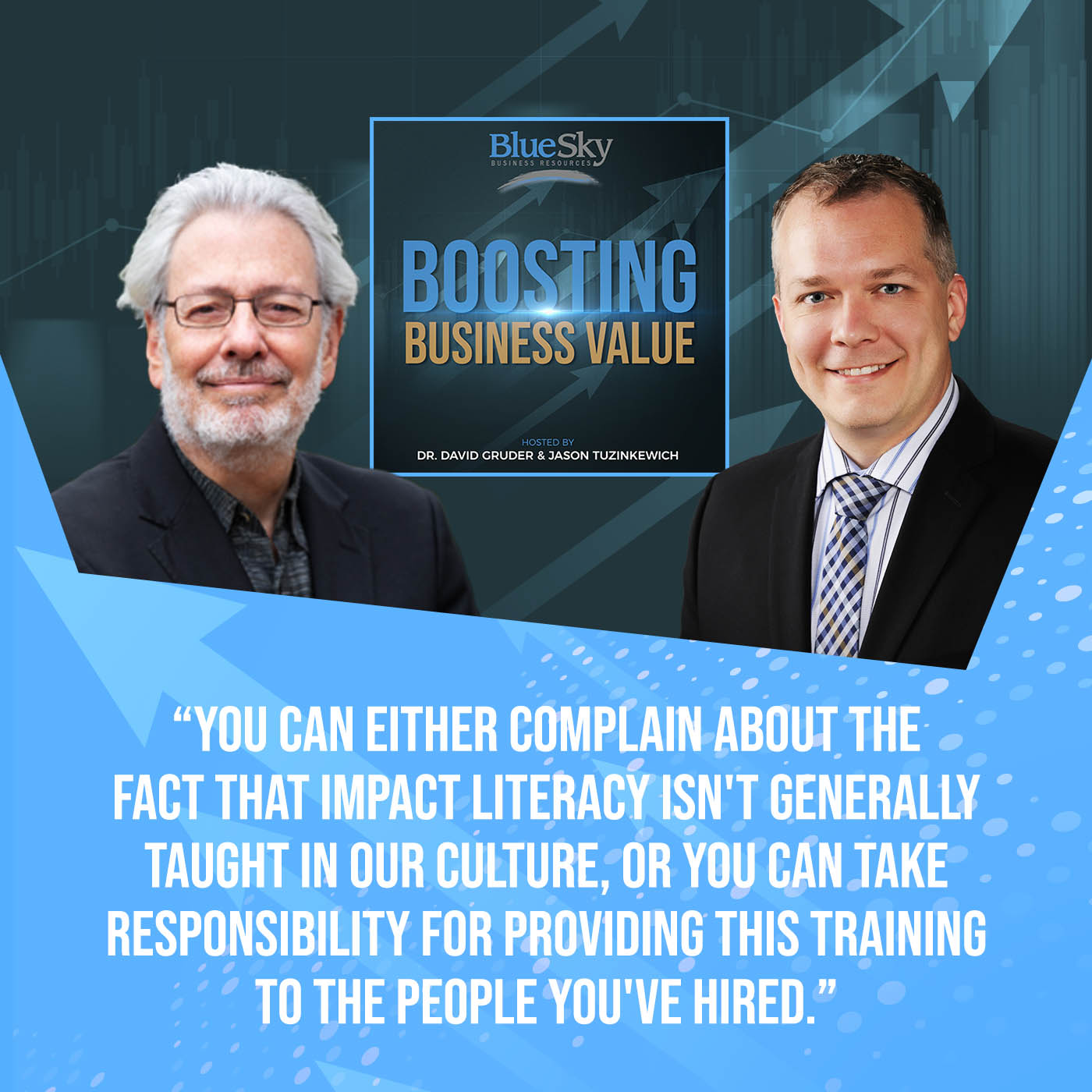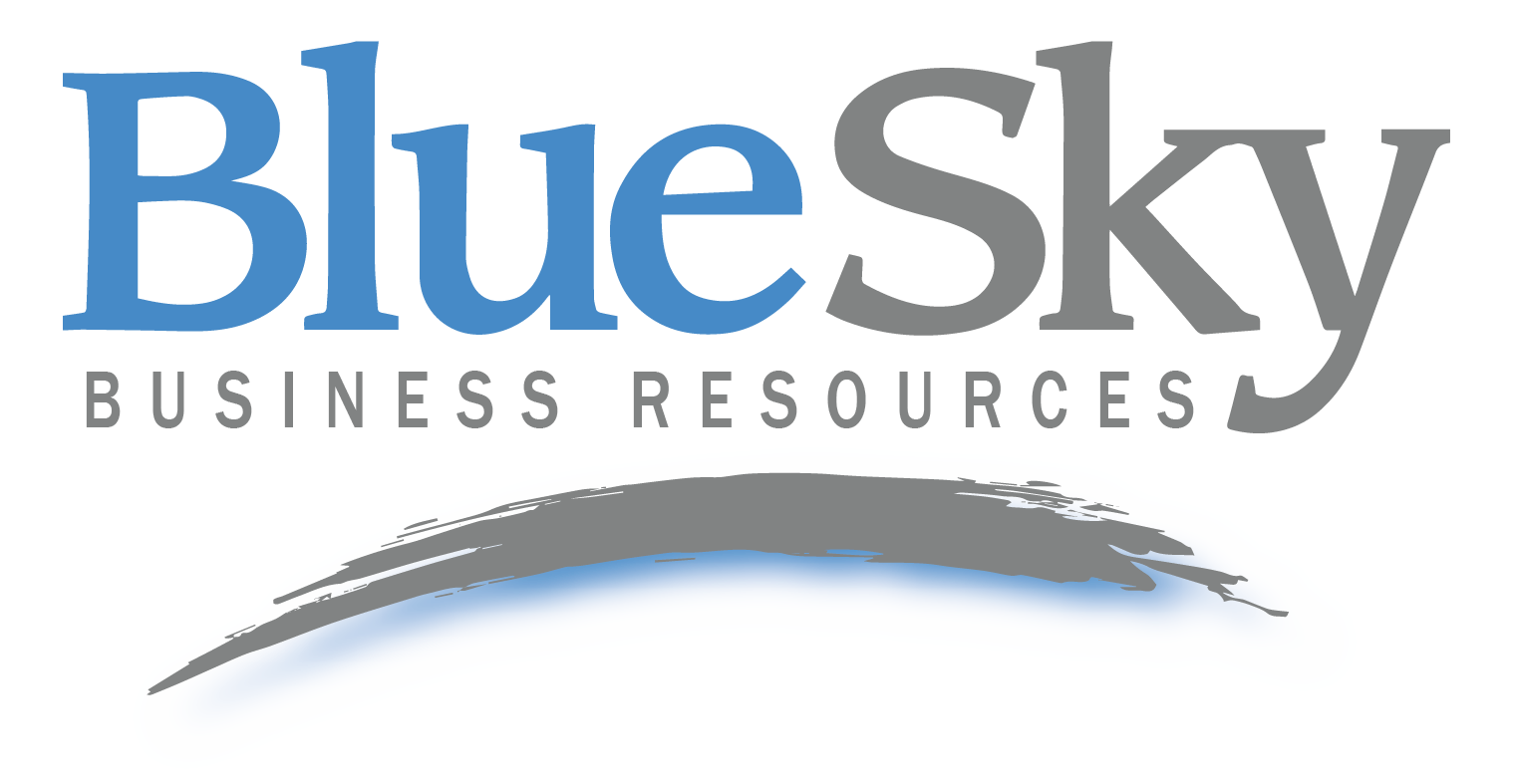Ep. 16 - Building Impact Literacy To Boost Your Business

Impact Literacy is openness to discovering your intended and unintended impacts on others – both positive and negative – and dedication to upleveling the alignment between your good intentions and your words and actions, so your impacts more fully match your intentions.
Impact Illiteracy is a hugely under-appreciated source of conflict, bad feelings, culture deterioration, and productivity deficits in companies. Most personnel don't come to your business with well-developed Impact Literacy skills. So it's up to you to help them develop those.
This episode points you in the right direction.
---
Watch the episode here
Listen to the podcast here
Building Impact Literacy To Boost Your Business
Supercharging Personnel Engagement & Collaboration By Cracking The Learned Helplessness Spell
In this episode, we're going to delve into a hugely underappreciated source of conflict, bad feelings, culture deterioration and productivity deficits in companies that is best-called impact literacy or in this case, impact illiteracy.
It’s great to see you again. I'm excited about this topic because it's one that you don't hear people talking a lot about. Let's start by answering the obvious question, which is, what is impact literacy? For me, it comes down to start by recognizing that no matter where you fit in an organization or a social group, your actions have an impact. Also, understanding how that capacity to have an impact by being and an even greater impact when you start doing can inform and enlighten your decision-making process is what we're talking about here. I know you've got more to add to this, Doctor.
I'm going to add to it by providing a contrast between what you've described as impact literacy and what impact literacy isn't. It’s the opposite of what you call impact illiteracy and there are two versions of that. One is in psychology called learned helplessness and the other is a form of tyranny. It's an end that justifies the means of tyranny. Let me describe each of those.
Learned helplessness is programming that a shocking percentage of people have been indoctrinated into that teaches them that nothing they do makes a difference and nothing they can do makes a difference. What that means is two-pronged. First of all, nothing positive I do has a positive impact and nothing negative I do has a negative impact. When somebody is carrying that programming that says nothing they do makes a difference, that form of impact illiteracy is technically in psychology called learned helplessness.
The other common variety of impact illiteracy is a form of tyranny. It’s a form of being over-controlling in which decisions are made and enacted in the mindset that an end justifies the means mindset. It’s where all that the person is interested in is a specific outcome regardless of how much damage the means by which that outcome is achieved creates and that's collateral damage. This kind of mindset that certain leaders have is that the end justifies the means and collateral damage is inevitable, unavoidable and irrelevant. “Don't bother me about collateral damage because we got done what I wanted to get done.” That's a form of impact illiteracy as well.
If you think about it, that's a form of learned helplessness as well because the side effects, the damage that it has caused were helpless to control so let's focus on getting to the end zone.
That's our framing around what impact literacy is and isn't. We want to go next into the three big challenges that we see with impact literacy. The first of those is that not all impacts are going to be readily recognizable. Most of us don't understand how decisions can lead to collateral or lagging damage or benefit.
Most of us don't understand how decisions can lead to collateral or lagging damage or benefit.
In other words, at the front end, a lot of people are so focused on the results they want that they don't spend enough time looking at the question of how they're going about attaining those results in terms of the impacts, the collateral damage or benefits that can be obtained or can result from a particular way of achieving a particular goal.
It's important at the front end to get in the habit with your team of identifying ahead of time what the potential negative and positive impacts are of a particular decision and the way of achieving that decision or that goal. Also, the ongoing willingness to discover as you're enacting the plan, what the unintended positive and negative impacts are so that you can adjust the plan so that it attains the goal that you're wanting to attain without the collateral damage that a particular approach to reaching that goal reveals itself as producing.
The people that get good at this impact literacy start to realize all of the interconnectedness. They start to see, “I know that my team is doing this and it's good for my team but I'm not going to, from here on out, forget that my team is part of a bigger whole. Also, as we move in this direction, we're going to be tugging other stakeholders, other members of the organization or our community in our direction, whether or not that's to their benefit.”
What you're talking about and what I was going to bring up tie into this getting out of the decision myopia of thinking, “I want to go here and that's all that matters,” to thinking, “If I go here, what else is impacted?” To that point, the big challenge in that is that we all, as people to varying degrees individual, are acutely aware of the impact that is placed upon us by the actions of others and the decisions of other groups.
However, we don't have the same perceptive acuity with regard to how our behaviors, decisions and actions do the same thing. One of the challenges is taking the blinders off and looking at who else can be impacted by this. One of the great outcomes, as you get better at impact literacy, is being a lot more holistic and inclusive in the decision-making process.

The last thing we want to cover in terms of big challenges with impact literacy is something that I see as a rampant pandemic around the world, including the United States but not limited to the United States, which we could summarize as expecting pass cards. What this means is that too many people have been trained to believe that if they learn they've had unintended negative impacts and they can justify why they did what they did anyway, that takes them off the hook about having to repair those negative impacts.
The illustration that I most like to use to describe that is if we are good pals. Jason and I are good pals and we're physically horsing around together one day. If we're physically horsing around and I accidentally step on Jason's foot with 15 pounds of pressure, his foot is going to register the same amount of pain that it would if I stepped on his foot on purpose with 15 pounds of pressure. Impact is impact regardless of intention.
The old story about the road to hell or the road to perdition being paved with good intentions is true. A lot of people have been trained to believe that they don't need to do a repair or make future commitments to handle future similar situations more effectively if their negative impact in a current situation was unintended. That's flat wrong. It's a culture killer if you have people who carry that belief.
Let's be clear because a lot of people get confused about this intention thing. If you cause harm unintentionally, the pathway to remediation is different than if you do it with malicious intent but there still has to be a pathway because harm was done. We're not saying that if you ignorantly, unintentionally or even well-intentioned caused harm, it doesn't mean that you should have to go through the same steps to repair the damage that was done as you would if you did it with malicious intent. It's a different path but the work still needs to be done because the damage was still done.
What I want to piggyback on about that is to be blunt in saying that if you discover as a business owner, executive or manager that you have someone on your team who is ill-intended, the intervention is getting rid of them and firing. There cannot be room in a healthy organization for ill-intended people. On the other hand, what needs to be normalized is that well-intentioned human beings are perfectly capable of and all of us, often do make what I call loving mistakes.
A loving intention and a mistaken expression of that intention that has unintended negative impacts on people who have good intentions and unintended negative impacts. There's a way to work with them to help them elevate their impact literacy so that those unintended negative impacts don't continue to happen.
At the end of the day, it comes down to respect. If you hurt somebody that you respect, no matter why that person got hurt, you're going to care enough because of the respect that you have to help make them whole. That's what we're talking about here. Enough of kicking that horse. Let's go into the roadmap for success. The first thing that we need to do as individuals to start having this impact literacy and making decisions with an impact awareness is to get better at assessing impact.

We've talked about this but understanding, who is potentially going to be impacted? How big is the biggest circle of people that are going to be touched by it? What are the smaller circles of impact within that? As you're looking at this range of impact, you can also start to think about the timing of the impact.
If you throw a stone in a pond, it's going to cause a ripple in the center that is big and immediate but it's going to take a few minutes to get to the shoreline. That ripple may be smaller. There's not always this immediacy of seeing the impacts. As we look at and work at getting better at assessing the range, as well as the magnitude of the impact that the decisions we're contemplating can have, we can start to contemplate better decisions.
Tying in with that, when we discover that we've had unintended negative impacts, the success roadmap calls for elevating our capacity to enter into no-shame teachability and enter into a state of openness to learning without our inner critic beating us up and shaming us to death or outer critics. However, our susceptibility to outer critics is in direct proportion to the degree to which our inner critic is the boss of us.
That doesn't mean that other people won't try to shame us but if we have the upper hand on our inner critic, other people's attempts to shame us won't land very easily. The idea here is that it's human to periodically make loving mistakes or have unintended negative impacts. There's no crime that's been committed. All that's been committed is humanness.
What that calls for is teachability. It calls for a willingness to discover the unintended negative impacts that we've had so that we can take steps to repair those and prevent them from recurring in the future. However, to be teachable, we have to be free of shame. If we go down a shame spiral when our human imperfections are revealed, then it's going to make it very hard for us to be teachable. We'll get defensive and justify instead.
It's important as we're talking about the success roadmap. We've talked a lot about the negative impacts and collateral damage but we also can sometimes in our human moments accidentally have positive impacts. Sometimes we delight people without even knowing what we're doing and we have this positive collateral damage, which is extraordinary.
However, we can either have that positive collateral damage, be glad it didn't go the other way and move on or in this impact literacy vein, we can be mindful. We can pay attention to, “We had a better impact than we thought we would. This is good. What did I do? What happened in this process that allowed for this unintended positive consequence? How can we build that into our decision-making awareness for the future?” The important thing about this is being more deliberate about avoiding negative consequences but also cultivating more positive outcomes.
That's so important because it's like the opposite of the old cliché, “If it is not broken, don't fix it.” If a discovery emerges that there is a positive collateral benefit that comes from a choice that's made or a goal that's pursued where certain positive impacts weren't known ahead of time, if it's better, repeat it. That's the opposite of, “If it is not broken, don't fix it.” If it's unintentionally positive, repeat it in the future on purpose.
That leads us to this idea. We talked a lot about good intentions and how that's not the path we want to pursue but instead, figuring out what accountability-capable commitments are for you. We've all heard people say, “If it's great, I did it. If it's wrong, blame them.” This is one of those situations where we want to be able to say, “Before we even embark on implementing a decision we've made, we want to be able to say, ‘If it goes well, we did it and if it doesn't go well, we learned.’”
That's the mindset that we have to have. It goes back to that no-shame teachability and respect for the others affected by this impact sphere but at the end of the day, it comes down to, “We're making the decision. We're going to be accountable.” We can live with that accountability no matter which direction we didn't foresee it going in.
That's a perfect segue into what I consider to be the heart and core of what teaches individuals and teams to impact literacy in any setting, especially in a business setting because that's what we're focused on in this show. It's a four-step process that I've facilitated for a very long time. It is remarkable how many constructive results and benefits it produces in a relatively short period.
It's what I call the collaboration breakdown repair process. It's got four steps to it. The first step is for each person that's involved in whatever the breakdown was to say what their unintended role was in that breakdown. This is part of the antidote to, “If it doesn't go well, blame them.” What my unintended role might have been was that I took someone's good intention statement as though it was an accountability-capable commitment when it was a good intention.
I thought, “I don't need to get progress updates from this person about how they're doing with their part in a project. Lo and behold, not having requested those interim updates resulted in my only learning that things got off track long after a lot of damage occurred. The principle here is that all conflict is either co-created or co-pro perpetuated, one or the other. We either co-create the conflict or if the conflict wasn't co-created by all of us. If it has been allowed to continue, all of us have been responsible in our particular ways for allowing it to continue, rather than dealing with it as soon as it arises.
All conflict is either co-created or co-pro perpetuated, one or the other.
We're talking about well-intended people here because the ill-intended ones have been eliminated. Among well-intended people, each person says what their unintended role was in the breakdown without shame or justification. “Here's what I didn't do or didn't say or what I did do or I did say.” In the second round, everyone takes a turn saying what their unintended negative impacts were from their unintended role without shame.
What you're hopefully hearing in what I'm describing so far is that people aren't telling each other what the other person's unintended roles and impacts are. Each person is saying that about themselves. The third step is each person goes around the circle and says what they're going to do to repair their unintended negative impact to whatever extent repair is possible. Sometimes situations are such that the damage is done, there's very little repair to do and sometimes there is some repair to be done.
However, where the rubber meets the road is in the fourth and final step, which is each person goes around the circle and says what their commitment is and what their plan is for handling future similar situations. A realistic and doable next step is better and more effective than they knew how to do in this current situation that they're dealing with.
When everyone emerges understanding from that conversation what their own and everyone else's commitment is for handling future similar situations more effectively, what happens is that a conflict or an implementation breakdown or a collaboration breakdown leads to greater teamwork. It leads to greater commitment, cultural well-being and productivity than existed before having this conversation.
I love that final accountability piece because when you take accountability with your team, it forges that bond where the team starts to test the waters. They'll see if they can trust it but because you went out there with it and made it public, it's a stronger bond than, “That won't happen again.” It has to be clear, defined and articulate to have that power but it's something you can get a lot better with over time. Thank you for that.

I want to piggyback on one thing there. The notion that it won't happen again, get over it. It'll happen again.
I have half a dozen human moments at least every day.
The thing to shoot for is it will happen differently. It will happen more effectively next time around and then the next time around, you'll do this again and out of that, you'll be able to do things even better than this next time around in the following time around. If I hear someone say, “I'm sorry. It'll never happen again,” all my red lights go off. It's like, “No. I'm sorry.” I'm sorry is a good beginning for a conversation but it's the opening that leads to responsibility-taking and creating a new plan. If it doesn't lead to that, then I'm sorry is worthless and the statement, “It will never happen again,” is delusional.
It's a blow-off. It's like saying, “My bad.” You're not taking accountability when you say, “My bad.” You're just blowing off the issue.
“I promise that this kind of circumstance will arise again but here's how I will handle it more effectively when it arises again.”
Doctor, it’s time for you to bring it home for us.
We'll do that together with two takeaways from this episode. I'll do the first one, which is that business owners, executives and managers would be very wise to accept that even the best-intentioned people that they hire likely have little to no training in impact literacy. The bottom line or the big takeaway here is you can either complain about the fact that impact literacy isn't generally taught in our culture or you can take responsibility for providing this training to the people you've hired because you've been satisfied in your interview and selection process that they are well-intentioned and teachable people.

If they're not teachable people, don't hire them. We talked a lot on this show about these self-actualization concepts of growing as a leader and a culture. One thing that they all have in common is that nobody comes out of the womb exceptional at these things. These are learned behaviors that require practice and training.
The more you and your team practice these things, the stronger you and your team get. With that strength comes whole new opportunities and outcomes that you can realize and achieve. The big takeaway for me is this is a learned behavior and practiced organizational skill that will open new doors and perspectives within your team.
Thank you so much. I hope you guys had as much fun as we did. Thank you so much for being a reader. Thank you for the comments and for supporting us on social media and anywhere else that you share good information with your colleagues and peers. We look forward to that. We do read comments and feedback and use that to shape new episodes. Please subscribe so that you don't miss a single one of our great discussions. We do have some exciting interviews coming up so be there for that.
Finally, we'd like to invite you to take advantage of a new free service that Blue Sky Business Resources has launched. It's a series of micro-surveys that are designed to help you gauge the quality of your organization in several strategic and operational metrics. They're free to take. You can take them out in your time. You can find them on our website at BlueSkyAdvisors.net. We hope that they're as valuable for you as they have been for us. We look forward to collaborating with you in the future.


0 comments
Leave a comment
Please log in or register to post a comment